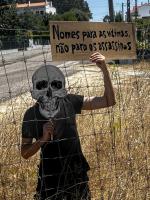 The art group The Party of the Dead was formed in Russia in 2017; its members have created numerous performances, working with the theme of the necropolitics of Putin's regime and his party. In one interview, artist and group member Ivan Zagibly describes the situation in Russia as follows: "Dictatorship does not come instantly; it takes twenty years. First, the media comes under the complete control of the party, then the courts and the legislature; NGOs are shut down; new laws restricting rights are passed; independent internet resources are blocked; the number of political prisoners grows. Most people don't notice this: the economy is growing, salaries are rising, everyone is getting used to it. It's like alcoholism: at first, it becomes normal to drink every day, then for weeks at a time, then to live in short, gloomy intervals between binges.
The art group The Party of the Dead was formed in Russia in 2017; its members have created numerous performances, working with the theme of the necropolitics of Putin's regime and his party. In one interview, artist and group member Ivan Zagibly describes the situation in Russia as follows: "Dictatorship does not come instantly; it takes twenty years. First, the media comes under the complete control of the party, then the courts and the legislature; NGOs are shut down; new laws restricting rights are passed; independent internet resources are blocked; the number of political prisoners grows. Most people don't notice this: the economy is growing, salaries are rising, everyone is getting used to it. It's like alcoholism: at first, it becomes normal to drink every day, then for weeks at a time, then to live in short, gloomy intervals between binges.
04.08.2025 | by Partido dos Mortos
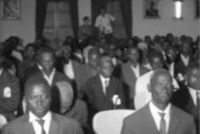 In Portugal, on one hand, leftists can use decolonization as that apologetic pat on the back, in an orgiastic self-flagellation of White guilt, always reiterating how Whites are horrible and privileged bastards who only know how to hurt the rest of the world. Apparently, this absurd and self-centered mea culpa makes the world fairer and abracadabrally fades away all issues of oppression. On the other hand, even right-wingers can use it to further fuel their unfounded hatred and their glimpses of grandeur, based on a romanticized past of conquest and domination as a show of intellectual and racial superiority.
In Portugal, on one hand, leftists can use decolonization as that apologetic pat on the back, in an orgiastic self-flagellation of White guilt, always reiterating how Whites are horrible and privileged bastards who only know how to hurt the rest of the world. Apparently, this absurd and self-centered mea culpa makes the world fairer and abracadabrally fades away all issues of oppression. On the other hand, even right-wingers can use it to further fuel their unfounded hatred and their glimpses of grandeur, based on a romanticized past of conquest and domination as a show of intellectual and racial superiority.
10.03.2025 | by Marinho de Pina
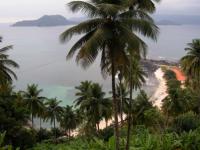 Meanwhile, at the resort, the tourist gets bored with the life of being comfortably laying down, among flabby women taking selfies, strutting families, monotonous food, and swimming pools all the time. The entertainment area only offers the disinterest of bored couples, or a group of bank colleagues getting loudly drunk. The islet has little of the Africa he had dreamed of (except for the impressive landscape, but that resembled some corner of Brazil). The local inhabitants, all expelled for pocket change to build little houses and free up the islet for tourists. A few young people from São Tomé who come and go in little rubber boats to sell handicrafts to tourists and fish to the restaurants. If he manages to extract information about the lives of the “locals,” as he was told, it is perfectly conditioned by the commercial relationship that mediated them.
Meanwhile, at the resort, the tourist gets bored with the life of being comfortably laying down, among flabby women taking selfies, strutting families, monotonous food, and swimming pools all the time. The entertainment area only offers the disinterest of bored couples, or a group of bank colleagues getting loudly drunk. The islet has little of the Africa he had dreamed of (except for the impressive landscape, but that resembled some corner of Brazil). The local inhabitants, all expelled for pocket change to build little houses and free up the islet for tourists. A few young people from São Tomé who come and go in little rubber boats to sell handicrafts to tourists and fish to the restaurants. If he manages to extract information about the lives of the “locals,” as he was told, it is perfectly conditioned by the commercial relationship that mediated them.
27.05.2024 | by Marta Lança
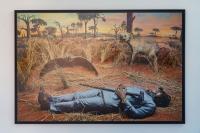 The river remembers the arrival of extractivism. One day many years ago, she feels the wake of huge ships against her current and became uneasy. Over time, she comes to share shivers with felled forests, to balk at the blanched palette of monocrop agriculture, to recoil at the sharp poisonous taste of chemical waste, and to deeply mourn the disappearance of her people: people sold into slavery, killed by disease, worked to death in mines, and severed from her nurturing flows by the breaking of their cultures. Oh, what she has seen. Oh, what she has endured.
The river remembers the arrival of extractivism. One day many years ago, she feels the wake of huge ships against her current and became uneasy. Over time, she comes to share shivers with felled forests, to balk at the blanched palette of monocrop agriculture, to recoil at the sharp poisonous taste of chemical waste, and to deeply mourn the disappearance of her people: people sold into slavery, killed by disease, worked to death in mines, and severed from her nurturing flows by the breaking of their cultures. Oh, what she has seen. Oh, what she has endured.
24.12.2023 | by Imani Jacqueline Brown
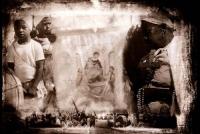 We demand that the Portuguese state, particularly the justice system, recognize the racial motivation behind this assault. We demand that, once and for all, it abandons a "minimalist" legal understanding of racism. We demand that it breaks away from the harmful pattern of denying racism, which endangers the lives of our children, our youth and the democratic life of this country.
We demand that the Portuguese state, particularly the justice system, recognize the racial motivation behind this assault. We demand that, once and for all, it abandons a "minimalist" legal understanding of racism. We demand that it breaks away from the harmful pattern of denying racism, which endangers the lives of our children, our youth and the democratic life of this country.
04.10.2023 | by vários
 Without prejudice to the investigation currently undertaken by the Independent Commission of the Center for Social Studies - whose findings are not yet known - with this statement, we want to express our solidarity and support with all the victims of sexual violence and moral harassment, as well as our support for denouncing these forms of violence anywhere, including at the Centre for Social Studies. We stand against any form of abuse of power
Without prejudice to the investigation currently undertaken by the Independent Commission of the Center for Social Studies - whose findings are not yet known - with this statement, we want to express our solidarity and support with all the victims of sexual violence and moral harassment, as well as our support for denouncing these forms of violence anywhere, including at the Centre for Social Studies. We stand against any form of abuse of power
25.09.2023 | by várias
 This controversy raises many questions, two of which we want to bring to the attention of the international academic community: Can we, as an academic community, allow a private publisher to intervene in and even censor such an important, urgent and necessary debate in our professional field? Academic writing is still the core tool of academic knowledge production worldwide, but when we as researchers are no longer allowed to reflect critically about how to transform our field from within, what are the implications for critical reflection on academia from within?
This controversy raises many questions, two of which we want to bring to the attention of the international academic community: Can we, as an academic community, allow a private publisher to intervene in and even censor such an important, urgent and necessary debate in our professional field? Academic writing is still the core tool of academic knowledge production worldwide, but when we as researchers are no longer allowed to reflect critically about how to transform our field from within, what are the implications for critical reflection on academia from within?
20.09.2023 | by várias
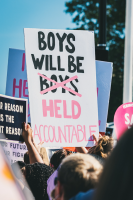 We present ourselves as a collective of women who have suffered different types of violence as a result of the pattern of abuse of power that was naturalized in the work teams led by Boaventura de Sousa Santos and considered inevitable by the people who occupied positions of authority in the Centre for Social Studies (CES) for many years. Our initial letter is attached below. Since we started to share our reflections, the number of people has increased. We have been in contact with other women who have experienced stories similar to ours. The abuse experienced is not limited to inconvenient moments promoted by a man incapable of understanding that the world has changed. It is very difficult to believe that a professional sociologist, internationally recognized as one of the greatest left-wing intellectuals, cannot understand the changes in society and adapt to them.
We present ourselves as a collective of women who have suffered different types of violence as a result of the pattern of abuse of power that was naturalized in the work teams led by Boaventura de Sousa Santos and considered inevitable by the people who occupied positions of authority in the Centre for Social Studies (CES) for many years. Our initial letter is attached below. Since we started to share our reflections, the number of people has increased. We have been in contact with other women who have experienced stories similar to ours. The abuse experienced is not limited to inconvenient moments promoted by a man incapable of understanding that the world has changed. It is very difficult to believe that a professional sociologist, internationally recognized as one of the greatest left-wing intellectuals, cannot understand the changes in society and adapt to them.
19.09.2023 | by várias
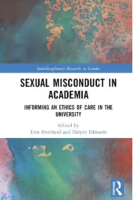 We address your Publisher as a collective of victims of harassment involving Boaventura de Sousa Santos and Bruno Sena Martins in the context of Boaventura de Sousa Santos' academic teams. Our collective is currently formed of seven women, of Brazilian, Portuguese, Peruvian and Mexican nationality. Our lived experiences allow us to confirm the abusive pattern described in chapter 12 of the book Sexual Misconduct in Academia: Informing an Ethics of Care in the University.
The publication of the book was decisive for our mobilization as a collective and for our decision to gather testimonial and documentary evidence that corroborate the various types of violence described in the mentioned chapter. In this sense, we note with great concern the unavailability for sale of the book.
We address your Publisher as a collective of victims of harassment involving Boaventura de Sousa Santos and Bruno Sena Martins in the context of Boaventura de Sousa Santos' academic teams. Our collective is currently formed of seven women, of Brazilian, Portuguese, Peruvian and Mexican nationality. Our lived experiences allow us to confirm the abusive pattern described in chapter 12 of the book Sexual Misconduct in Academia: Informing an Ethics of Care in the University.
The publication of the book was decisive for our mobilization as a collective and for our decision to gather testimonial and documentary evidence that corroborate the various types of violence described in the mentioned chapter. In this sense, we note with great concern the unavailability for sale of the book.
19.09.2023 | by várias
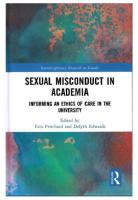 We demand that the editorial immediately republishes the entire book, article included.
We demand that the scholars put in the spotlight by the article cease all persecution of the researchers and the other victims that have come forward.
We demand that those scholars start walking the talk, and be consequent with their writings. This includes making themselves available for a real process of restorative justice.
We demand that academic institutions, including academic presses, seriously commission diverse and unbiased task forces to bring about reparations for the practices of abuse fostered by the racist, capitalist and patriarchal system of which they are part - in a historical and immediate sense.
We all know.
We demand that the editorial immediately republishes the entire book, article included.
We demand that the scholars put in the spotlight by the article cease all persecution of the researchers and the other victims that have come forward.
We demand that those scholars start walking the talk, and be consequent with their writings. This includes making themselves available for a real process of restorative justice.
We demand that academic institutions, including academic presses, seriously commission diverse and unbiased task forces to bring about reparations for the practices of abuse fostered by the racist, capitalist and patriarchal system of which they are part - in a historical and immediate sense.
We all know.
04.09.2023 | by várias
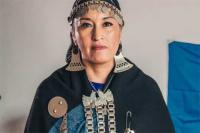 As a result of the painful and humiliating situation caused by your abuse and the realization that my institutional isolation and helplessness at the time were a response to machismo and racism, I channeled my anger and wounds like a guiding force. I embarked on a journey to the ends of the vast territories of Indigenous peoples in Argentina to establish the Movement of Indigenous Women and Diversities for Good Living. Today, I can say that I walked to heal. The academic indifference I endured was replaced by the love and strength of thousands of Indigenous women who experience the violence you embody and represent daily. Regardless of your concerns that the Right is using these complaints, you know you benefit from the system. The Right needs hypocrites like you.
As a result of the painful and humiliating situation caused by your abuse and the realization that my institutional isolation and helplessness at the time were a response to machismo and racism, I channeled my anger and wounds like a guiding force. I embarked on a journey to the ends of the vast territories of Indigenous peoples in Argentina to establish the Movement of Indigenous Women and Diversities for Good Living. Today, I can say that I walked to heal. The academic indifference I endured was replaced by the love and strength of thousands of Indigenous women who experience the violence you embody and represent daily. Regardless of your concerns that the Right is using these complaints, you know you benefit from the system. The Right needs hypocrites like you.
25.06.2023 | by Moira Ivana Millán
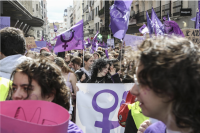 The Academy (with a capital A and in singular) is for us a field of contestation. And, without a doubt, we are all positioned in it once we dare to enter it, dialogue with it, challenge it, inhabit it and/or co-construct it. Many of us have occupied this space by choice and with conviction. We face this reality every minute of our lives. That is why the manifesto “We all know” resonates and challenges us when it states that epistemic extractivism is structural and not just an isolated event in the Academy. When it affirms that the Academy is hierarchical and hierarchizing and that it promotes the accumulation of power of those at the top.
The Academy (with a capital A and in singular) is for us a field of contestation. And, without a doubt, we are all positioned in it once we dare to enter it, dialogue with it, challenge it, inhabit it and/or co-construct it. Many of us have occupied this space by choice and with conviction. We face this reality every minute of our lives. That is why the manifesto “We all know” resonates and challenges us when it states that epistemic extractivism is structural and not just an isolated event in the Academy. When it affirms that the Academy is hierarchical and hierarchizing and that it promotes the accumulation of power of those at the top.
28.04.2023 | by várias
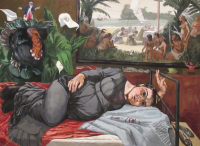 In light of current public debates sparked by the publication of the chapter "The walls spoke when no one else would: Autoethnographic notes on sexual-power gatekeeping within avant-garde academia," included in the edited volume Sexual Misconduct in Academia: Informing an Ethics of Care in the University (Routledge 2023), we express our full solidarity with the authors. We extend the same solidarity to other voices that came out publicly, as well as to all those subjected to abuses of power and other forms of violence both in academic contexts and beyond. This document is a collective and unfinished contribution to an ongoing debate.
In light of current public debates sparked by the publication of the chapter "The walls spoke when no one else would: Autoethnographic notes on sexual-power gatekeeping within avant-garde academia," included in the edited volume Sexual Misconduct in Academia: Informing an Ethics of Care in the University (Routledge 2023), we express our full solidarity with the authors. We extend the same solidarity to other voices that came out publicly, as well as to all those subjected to abuses of power and other forms of violence both in academic contexts and beyond. This document is a collective and unfinished contribution to an ongoing debate.
18.04.2023 | by várias
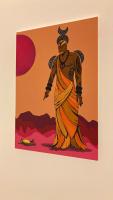 In Portugal we have no racial-ethnic categorization legally approved. That means we are not legally able to identify social inequalities in terms of race. This is an important warning of how Portuguese society works and how this social silence from politics informs us that they are not interested in identifying this problem. But we can do this visually. Just look who are the people that are leading art institutions and curatorship to understand this gap. I created a blog - an informal exercise - where I put some information about this gap.
In Portugal we have no racial-ethnic categorization legally approved. That means we are not legally able to identify social inequalities in terms of race. This is an important warning of how Portuguese society works and how this social silence from politics informs us that they are not interested in identifying this problem. But we can do this visually. Just look who are the people that are leading art institutions and curatorship to understand this gap. I created a blog - an informal exercise - where I put some information about this gap.
13.03.2023 | by Rodrigo Ribeiro Saturnino (ROD)
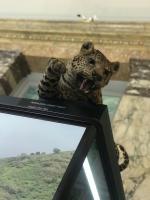 Institutionalized violence shapes who people are—victims and perpetrators alike—to an extent that only the recovery of the condition of plurality can undo it. This points to the most basic right immanent to the human condition, which imperialism constantly compromises: the right not to act against others; in its positive formulation: the right to act alongside and with one another. “Accepting this right in its two forms as fundamental is necessary in order to imagine reparations, so the bliss of being active and repairing what was broken can be attained.
Institutionalized violence shapes who people are—victims and perpetrators alike—to an extent that only the recovery of the condition of plurality can undo it. This points to the most basic right immanent to the human condition, which imperialism constantly compromises: the right not to act against others; in its positive formulation: the right to act alongside and with one another. “Accepting this right in its two forms as fundamental is necessary in order to imagine reparations, so the bliss of being active and repairing what was broken can be attained.
11.08.2022 | by Ariella Aisha Azoulay
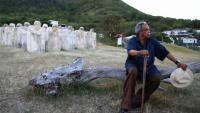 The focus of the Paris conference was on Glissant’s key concepts of relation, opacity, creolization, and disaffiliation. The Martinique-born writer and thinker was, of course, the first philosopher of post-filiation, by which I refer not only to his rebellious thesis of disaffiliation, in the sense of breaking with a genealogy and tradition of Western and non-Western philosophies concerned with binary opposition and contradiction, but also to him as a self-engendered philosopher. By this I mean that he re-created himself in order to surpass a pathological inextricability, which he associated with our contemporary human condition. Indeed, to say that Glissant is a post-filiation philosopher is mostly to recognize his role as a theorizer of the concept of relation, which moves beyond the oppositional discourse of the same and the other, operating instead with a new vision of difference as an assembler of the “dissimilars.”
The focus of the Paris conference was on Glissant’s key concepts of relation, opacity, creolization, and disaffiliation. The Martinique-born writer and thinker was, of course, the first philosopher of post-filiation, by which I refer not only to his rebellious thesis of disaffiliation, in the sense of breaking with a genealogy and tradition of Western and non-Western philosophies concerned with binary opposition and contradiction, but also to him as a self-engendered philosopher. By this I mean that he re-created himself in order to surpass a pathological inextricability, which he associated with our contemporary human condition. Indeed, to say that Glissant is a post-filiation philosopher is mostly to recognize his role as a theorizer of the concept of relation, which moves beyond the oppositional discourse of the same and the other, operating instead with a new vision of difference as an assembler of the “dissimilars.”
06.07.2022 | by Manthia Diawara
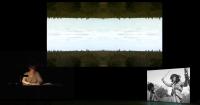 When our grandmother beheaded chicken, my brother begged: "don't kill the animals, let's go buy food at the supermarket". When did this happen? Ignoring the death of other beings in order to live. Wishing we didn't know about the destruction around our bubble. Was it when our parents moved from the countryside to the city? Was it when our thumb started to touch the screen more often? Animals? Only pets. Jungles? Only urban ones. In our houses, we clean up everything that reminds us of the dust from where we came from. Little pigs go to school, cats wear boots, play the piano and speak French, crickets are our consciousness, Elsa is the name of a depression, Katrina of a hurricane, Bárbara of a storm. Savagery instead of a country. Elements of land and sea as resources. People as users. Identities as consumption objects. Consuming, consuming to stabilise this fucked up disruption.
When our grandmother beheaded chicken, my brother begged: "don't kill the animals, let's go buy food at the supermarket". When did this happen? Ignoring the death of other beings in order to live. Wishing we didn't know about the destruction around our bubble. Was it when our parents moved from the countryside to the city? Was it when our thumb started to touch the screen more often? Animals? Only pets. Jungles? Only urban ones. In our houses, we clean up everything that reminds us of the dust from where we came from. Little pigs go to school, cats wear boots, play the piano and speak French, crickets are our consciousness, Elsa is the name of a depression, Katrina of a hurricane, Bárbara of a storm. Savagery instead of a country. Elements of land and sea as resources. People as users. Identities as consumption objects. Consuming, consuming to stabilise this fucked up disruption.
07.01.2022 | by Marta Lança
 Hoje o Tarrafal é um museu e monumento nacional e, desde 2004, integra a lista indicativa de Património Mundial da UNESCO. Portugal, para além de ter ajudado com a criação e desenvolvimento deste museu, anunciou em 2019 que iria apoiar Cabo Verde com a sua candidatura do Tarrafal à UNESCO. Recentemente, foram levadas a cabo obras de restauro do espaço, por uma empresa portuguesa, e no próximo 5 de Julho, os governos de Cabo Verde e Portugal vão assinar um memorando de entendimento para a candidatura deste espaço à UNESCO.
Hoje o Tarrafal é um museu e monumento nacional e, desde 2004, integra a lista indicativa de Património Mundial da UNESCO. Portugal, para além de ter ajudado com a criação e desenvolvimento deste museu, anunciou em 2019 que iria apoiar Cabo Verde com a sua candidatura do Tarrafal à UNESCO. Recentemente, foram levadas a cabo obras de restauro do espaço, por uma empresa portuguesa, e no próximo 5 de Julho, os governos de Cabo Verde e Portugal vão assinar um memorando de entendimento para a candidatura deste espaço à UNESCO.
24.06.2021 | by Sofia Lovegrove
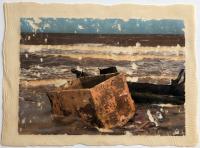 In her first solo exhibition at Simone Cadinelli Art Gallery, Jeane Terra shows works that are related, directly or indirectly, to the events in Atafona, that are about the ruins produced by the clash between the sea and the city; such events point to the fact that everything that was, is or will be built is going to turn into rubble.
In her first solo exhibition at Simone Cadinelli Art Gallery, Jeane Terra shows works that are related, directly or indirectly, to the events in Atafona, that are about the ruins produced by the clash between the sea and the city; such events point to the fact that everything that was, is or will be built is going to turn into rubble.
16.05.2021 | by Agnaldo Farias
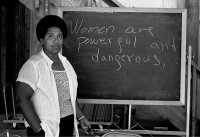 Audre Lorde asks, “What does it mean when the tools of a racist patriarchy are used to examine the fruits of that same patriarchy?” Lorde’s critique of hierarchies within what is then a predominantly white, middle-class, heteronormative, able-bodied second-wave feminism invites reevaluation of the chalk circles of individual identity that fix structural inequality and prevent viable liberation from taking shape. An existentialism disconnected from dynamic modes of praxis grounded in “the interdependence of mutual (nondominant) differences” fortifies oppression.
Audre Lorde asks, “What does it mean when the tools of a racist patriarchy are used to examine the fruits of that same patriarchy?” Lorde’s critique of hierarchies within what is then a predominantly white, middle-class, heteronormative, able-bodied second-wave feminism invites reevaluation of the chalk circles of individual identity that fix structural inequality and prevent viable liberation from taking shape. An existentialism disconnected from dynamic modes of praxis grounded in “the interdependence of mutual (nondominant) differences” fortifies oppression.
03.03.2021 | by Keelyn Bradley
 The art group The Party of the Dead was formed in Russia in 2017; its members have created numerous performances, working with the theme of the necropolitics of Putin's regime and his party. In one interview, artist and group member Ivan Zagibly describes the situation in Russia as follows: "Dictatorship does not come instantly; it takes twenty years. First, the media comes under the complete control of the party, then the courts and the legislature; NGOs are shut down; new laws restricting rights are passed; independent internet resources are blocked; the number of political prisoners grows. Most people don't notice this: the economy is growing, salaries are rising, everyone is getting used to it. It's like alcoholism: at first, it becomes normal to drink every day, then for weeks at a time, then to live in short, gloomy intervals between binges.
The art group The Party of the Dead was formed in Russia in 2017; its members have created numerous performances, working with the theme of the necropolitics of Putin's regime and his party. In one interview, artist and group member Ivan Zagibly describes the situation in Russia as follows: "Dictatorship does not come instantly; it takes twenty years. First, the media comes under the complete control of the party, then the courts and the legislature; NGOs are shut down; new laws restricting rights are passed; independent internet resources are blocked; the number of political prisoners grows. Most people don't notice this: the economy is growing, salaries are rising, everyone is getting used to it. It's like alcoholism: at first, it becomes normal to drink every day, then for weeks at a time, then to live in short, gloomy intervals between binges.  In Portugal, on one hand, leftists can use decolonization as that apologetic pat on the back, in an orgiastic self-flagellation of White guilt, always reiterating how Whites are horrible and privileged bastards who only know how to hurt the rest of the world. Apparently, this absurd and self-centered mea culpa makes the world fairer and abracadabrally fades away all issues of oppression. On the other hand, even right-wingers can use it to further fuel their unfounded hatred and their glimpses of grandeur, based on a romanticized past of conquest and domination as a show of intellectual and racial superiority.
In Portugal, on one hand, leftists can use decolonization as that apologetic pat on the back, in an orgiastic self-flagellation of White guilt, always reiterating how Whites are horrible and privileged bastards who only know how to hurt the rest of the world. Apparently, this absurd and self-centered mea culpa makes the world fairer and abracadabrally fades away all issues of oppression. On the other hand, even right-wingers can use it to further fuel their unfounded hatred and their glimpses of grandeur, based on a romanticized past of conquest and domination as a show of intellectual and racial superiority.  Meanwhile, at the resort, the tourist gets bored with the life of being comfortably laying down, among flabby women taking selfies, strutting families, monotonous food, and swimming pools all the time. The entertainment area only offers the disinterest of bored couples, or a group of bank colleagues getting loudly drunk. The islet has little of the Africa he had dreamed of (except for the impressive landscape, but that resembled some corner of Brazil). The local inhabitants, all expelled for pocket change to build little houses and free up the islet for tourists. A few young people from São Tomé who come and go in little rubber boats to sell handicrafts to tourists and fish to the restaurants. If he manages to extract information about the lives of the “locals,” as he was told, it is perfectly conditioned by the commercial relationship that mediated them.
Meanwhile, at the resort, the tourist gets bored with the life of being comfortably laying down, among flabby women taking selfies, strutting families, monotonous food, and swimming pools all the time. The entertainment area only offers the disinterest of bored couples, or a group of bank colleagues getting loudly drunk. The islet has little of the Africa he had dreamed of (except for the impressive landscape, but that resembled some corner of Brazil). The local inhabitants, all expelled for pocket change to build little houses and free up the islet for tourists. A few young people from São Tomé who come and go in little rubber boats to sell handicrafts to tourists and fish to the restaurants. If he manages to extract information about the lives of the “locals,” as he was told, it is perfectly conditioned by the commercial relationship that mediated them.  The river remembers the arrival of extractivism. One day many years ago, she feels the wake of huge ships against her current and became uneasy. Over time, she comes to share shivers with felled forests, to balk at the blanched palette of monocrop agriculture, to recoil at the sharp poisonous taste of chemical waste, and to deeply mourn the disappearance of her people: people sold into slavery, killed by disease, worked to death in mines, and severed from her nurturing flows by the breaking of their cultures. Oh, what she has seen. Oh, what she has endured.
The river remembers the arrival of extractivism. One day many years ago, she feels the wake of huge ships against her current and became uneasy. Over time, she comes to share shivers with felled forests, to balk at the blanched palette of monocrop agriculture, to recoil at the sharp poisonous taste of chemical waste, and to deeply mourn the disappearance of her people: people sold into slavery, killed by disease, worked to death in mines, and severed from her nurturing flows by the breaking of their cultures. Oh, what she has seen. Oh, what she has endured.  We demand that the Portuguese state, particularly the justice system, recognize the racial motivation behind this assault. We demand that, once and for all, it abandons a "minimalist" legal understanding of racism. We demand that it breaks away from the harmful pattern of denying racism, which endangers the lives of our children, our youth and the democratic life of this country.
We demand that the Portuguese state, particularly the justice system, recognize the racial motivation behind this assault. We demand that, once and for all, it abandons a "minimalist" legal understanding of racism. We demand that it breaks away from the harmful pattern of denying racism, which endangers the lives of our children, our youth and the democratic life of this country.  Without prejudice to the investigation currently undertaken by the Independent Commission of the Center for Social Studies - whose findings are not yet known - with this statement, we want to express our solidarity and support with all the victims of sexual violence and moral harassment, as well as our support for denouncing these forms of violence anywhere, including at the Centre for Social Studies. We stand against any form of abuse of power
Without prejudice to the investigation currently undertaken by the Independent Commission of the Center for Social Studies - whose findings are not yet known - with this statement, we want to express our solidarity and support with all the victims of sexual violence and moral harassment, as well as our support for denouncing these forms of violence anywhere, including at the Centre for Social Studies. We stand against any form of abuse of power  This controversy raises many questions, two of which we want to bring to the attention of the international academic community: Can we, as an academic community, allow a private publisher to intervene in and even censor such an important, urgent and necessary debate in our professional field? Academic writing is still the core tool of academic knowledge production worldwide, but when we as researchers are no longer allowed to reflect critically about how to transform our field from within, what are the implications for critical reflection on academia from within?
This controversy raises many questions, two of which we want to bring to the attention of the international academic community: Can we, as an academic community, allow a private publisher to intervene in and even censor such an important, urgent and necessary debate in our professional field? Academic writing is still the core tool of academic knowledge production worldwide, but when we as researchers are no longer allowed to reflect critically about how to transform our field from within, what are the implications for critical reflection on academia from within?  We present ourselves as a collective of women who have suffered different types of violence as a result of the pattern of abuse of power that was naturalized in the work teams led by Boaventura de Sousa Santos and considered inevitable by the people who occupied positions of authority in the Centre for Social Studies (CES) for many years. Our initial letter is attached below. Since we started to share our reflections, the number of people has increased. We have been in contact with other women who have experienced stories similar to ours. The abuse experienced is not limited to inconvenient moments promoted by a man incapable of understanding that the world has changed. It is very difficult to believe that a professional sociologist, internationally recognized as one of the greatest left-wing intellectuals, cannot understand the changes in society and adapt to them.
We present ourselves as a collective of women who have suffered different types of violence as a result of the pattern of abuse of power that was naturalized in the work teams led by Boaventura de Sousa Santos and considered inevitable by the people who occupied positions of authority in the Centre for Social Studies (CES) for many years. Our initial letter is attached below. Since we started to share our reflections, the number of people has increased. We have been in contact with other women who have experienced stories similar to ours. The abuse experienced is not limited to inconvenient moments promoted by a man incapable of understanding that the world has changed. It is very difficult to believe that a professional sociologist, internationally recognized as one of the greatest left-wing intellectuals, cannot understand the changes in society and adapt to them.  We address your Publisher as a collective of victims of harassment involving Boaventura de Sousa Santos and Bruno Sena Martins in the context of Boaventura de Sousa Santos' academic teams. Our collective is currently formed of seven women, of Brazilian, Portuguese, Peruvian and Mexican nationality. Our lived experiences allow us to confirm the abusive pattern described in chapter 12 of the book Sexual Misconduct in Academia: Informing an Ethics of Care in the University.
The publication of the book was decisive for our mobilization as a collective and for our decision to gather testimonial and documentary evidence that corroborate the various types of violence described in the mentioned chapter. In this sense, we note with great concern the unavailability for sale of the book.
We address your Publisher as a collective of victims of harassment involving Boaventura de Sousa Santos and Bruno Sena Martins in the context of Boaventura de Sousa Santos' academic teams. Our collective is currently formed of seven women, of Brazilian, Portuguese, Peruvian and Mexican nationality. Our lived experiences allow us to confirm the abusive pattern described in chapter 12 of the book Sexual Misconduct in Academia: Informing an Ethics of Care in the University.
The publication of the book was decisive for our mobilization as a collective and for our decision to gather testimonial and documentary evidence that corroborate the various types of violence described in the mentioned chapter. In this sense, we note with great concern the unavailability for sale of the book.  We demand that the editorial immediately republishes the entire book, article included.
We demand that the scholars put in the spotlight by the article cease all persecution of the researchers and the other victims that have come forward.
We demand that those scholars start walking the talk, and be consequent with their writings. This includes making themselves available for a real process of restorative justice.
We demand that academic institutions, including academic presses, seriously commission diverse and unbiased task forces to bring about reparations for the practices of abuse fostered by the racist, capitalist and patriarchal system of which they are part - in a historical and immediate sense.
We all know.
We demand that the editorial immediately republishes the entire book, article included.
We demand that the scholars put in the spotlight by the article cease all persecution of the researchers and the other victims that have come forward.
We demand that those scholars start walking the talk, and be consequent with their writings. This includes making themselves available for a real process of restorative justice.
We demand that academic institutions, including academic presses, seriously commission diverse and unbiased task forces to bring about reparations for the practices of abuse fostered by the racist, capitalist and patriarchal system of which they are part - in a historical and immediate sense.
We all know.  As a result of the painful and humiliating situation caused by your abuse and the realization that my institutional isolation and helplessness at the time were a response to machismo and racism, I channeled my anger and wounds like a guiding force. I embarked on a journey to the ends of the vast territories of Indigenous peoples in Argentina to establish the Movement of Indigenous Women and Diversities for Good Living. Today, I can say that I walked to heal. The academic indifference I endured was replaced by the love and strength of thousands of Indigenous women who experience the violence you embody and represent daily. Regardless of your concerns that the Right is using these complaints, you know you benefit from the system. The Right needs hypocrites like you.
As a result of the painful and humiliating situation caused by your abuse and the realization that my institutional isolation and helplessness at the time were a response to machismo and racism, I channeled my anger and wounds like a guiding force. I embarked on a journey to the ends of the vast territories of Indigenous peoples in Argentina to establish the Movement of Indigenous Women and Diversities for Good Living. Today, I can say that I walked to heal. The academic indifference I endured was replaced by the love and strength of thousands of Indigenous women who experience the violence you embody and represent daily. Regardless of your concerns that the Right is using these complaints, you know you benefit from the system. The Right needs hypocrites like you.  The Academy (with a capital A and in singular) is for us a field of contestation. And, without a doubt, we are all positioned in it once we dare to enter it, dialogue with it, challenge it, inhabit it and/or co-construct it. Many of us have occupied this space by choice and with conviction. We face this reality every minute of our lives. That is why the manifesto “We all know” resonates and challenges us when it states that epistemic extractivism is structural and not just an isolated event in the Academy. When it affirms that the Academy is hierarchical and hierarchizing and that it promotes the accumulation of power of those at the top.
The Academy (with a capital A and in singular) is for us a field of contestation. And, without a doubt, we are all positioned in it once we dare to enter it, dialogue with it, challenge it, inhabit it and/or co-construct it. Many of us have occupied this space by choice and with conviction. We face this reality every minute of our lives. That is why the manifesto “We all know” resonates and challenges us when it states that epistemic extractivism is structural and not just an isolated event in the Academy. When it affirms that the Academy is hierarchical and hierarchizing and that it promotes the accumulation of power of those at the top.  In light of current public debates sparked by the publication of the chapter "The walls spoke when no one else would: Autoethnographic notes on sexual-power gatekeeping within avant-garde academia," included in the edited volume Sexual Misconduct in Academia: Informing an Ethics of Care in the University (Routledge 2023), we express our full solidarity with the authors. We extend the same solidarity to other voices that came out publicly, as well as to all those subjected to abuses of power and other forms of violence both in academic contexts and beyond. This document is a collective and unfinished contribution to an ongoing debate.
In light of current public debates sparked by the publication of the chapter "The walls spoke when no one else would: Autoethnographic notes on sexual-power gatekeeping within avant-garde academia," included in the edited volume Sexual Misconduct in Academia: Informing an Ethics of Care in the University (Routledge 2023), we express our full solidarity with the authors. We extend the same solidarity to other voices that came out publicly, as well as to all those subjected to abuses of power and other forms of violence both in academic contexts and beyond. This document is a collective and unfinished contribution to an ongoing debate.  In Portugal we have no racial-ethnic categorization legally approved. That means we are not legally able to identify social inequalities in terms of race. This is an important warning of how Portuguese society works and how this social silence from politics informs us that they are not interested in identifying this problem. But we can do this visually. Just look who are the people that are leading art institutions and curatorship to understand this gap. I created a blog - an informal exercise - where I put some information about this gap.
In Portugal we have no racial-ethnic categorization legally approved. That means we are not legally able to identify social inequalities in terms of race. This is an important warning of how Portuguese society works and how this social silence from politics informs us that they are not interested in identifying this problem. But we can do this visually. Just look who are the people that are leading art institutions and curatorship to understand this gap. I created a blog - an informal exercise - where I put some information about this gap.  Institutionalized violence shapes who people are—victims and perpetrators alike—to an extent that only the recovery of the condition of plurality can undo it. This points to the most basic right immanent to the human condition, which imperialism constantly compromises: the right not to act against others; in its positive formulation: the right to act alongside and with one another. “Accepting this right in its two forms as fundamental is necessary in order to imagine reparations, so the bliss of being active and repairing what was broken can be attained.
Institutionalized violence shapes who people are—victims and perpetrators alike—to an extent that only the recovery of the condition of plurality can undo it. This points to the most basic right immanent to the human condition, which imperialism constantly compromises: the right not to act against others; in its positive formulation: the right to act alongside and with one another. “Accepting this right in its two forms as fundamental is necessary in order to imagine reparations, so the bliss of being active and repairing what was broken can be attained.  The focus of the Paris conference was on Glissant’s key concepts of relation, opacity, creolization, and disaffiliation. The Martinique-born writer and thinker was, of course, the first philosopher of post-filiation, by which I refer not only to his rebellious thesis of disaffiliation, in the sense of breaking with a genealogy and tradition of Western and non-Western philosophies concerned with binary opposition and contradiction, but also to him as a self-engendered philosopher. By this I mean that he re-created himself in order to surpass a pathological inextricability, which he associated with our contemporary human condition. Indeed, to say that Glissant is a post-filiation philosopher is mostly to recognize his role as a theorizer of the concept of relation, which moves beyond the oppositional discourse of the same and the other, operating instead with a new vision of difference as an assembler of the “dissimilars.”
The focus of the Paris conference was on Glissant’s key concepts of relation, opacity, creolization, and disaffiliation. The Martinique-born writer and thinker was, of course, the first philosopher of post-filiation, by which I refer not only to his rebellious thesis of disaffiliation, in the sense of breaking with a genealogy and tradition of Western and non-Western philosophies concerned with binary opposition and contradiction, but also to him as a self-engendered philosopher. By this I mean that he re-created himself in order to surpass a pathological inextricability, which he associated with our contemporary human condition. Indeed, to say that Glissant is a post-filiation philosopher is mostly to recognize his role as a theorizer of the concept of relation, which moves beyond the oppositional discourse of the same and the other, operating instead with a new vision of difference as an assembler of the “dissimilars.”  When our grandmother beheaded chicken, my brother begged: "don't kill the animals, let's go buy food at the supermarket". When did this happen? Ignoring the death of other beings in order to live. Wishing we didn't know about the destruction around our bubble. Was it when our parents moved from the countryside to the city? Was it when our thumb started to touch the screen more often? Animals? Only pets. Jungles? Only urban ones. In our houses, we clean up everything that reminds us of the dust from where we came from. Little pigs go to school, cats wear boots, play the piano and speak French, crickets are our consciousness, Elsa is the name of a depression, Katrina of a hurricane, Bárbara of a storm. Savagery instead of a country. Elements of land and sea as resources. People as users. Identities as consumption objects. Consuming, consuming to stabilise this fucked up disruption.
When our grandmother beheaded chicken, my brother begged: "don't kill the animals, let's go buy food at the supermarket". When did this happen? Ignoring the death of other beings in order to live. Wishing we didn't know about the destruction around our bubble. Was it when our parents moved from the countryside to the city? Was it when our thumb started to touch the screen more often? Animals? Only pets. Jungles? Only urban ones. In our houses, we clean up everything that reminds us of the dust from where we came from. Little pigs go to school, cats wear boots, play the piano and speak French, crickets are our consciousness, Elsa is the name of a depression, Katrina of a hurricane, Bárbara of a storm. Savagery instead of a country. Elements of land and sea as resources. People as users. Identities as consumption objects. Consuming, consuming to stabilise this fucked up disruption.  Hoje o Tarrafal é um museu e monumento nacional e, desde 2004, integra a lista indicativa de Património Mundial da UNESCO. Portugal, para além de ter ajudado com a criação e desenvolvimento deste museu, anunciou em 2019 que iria apoiar Cabo Verde com a sua candidatura do Tarrafal à UNESCO. Recentemente, foram levadas a cabo obras de restauro do espaço, por uma empresa portuguesa, e no próximo 5 de Julho, os governos de Cabo Verde e Portugal vão assinar um memorando de entendimento para a candidatura deste espaço à UNESCO.
Hoje o Tarrafal é um museu e monumento nacional e, desde 2004, integra a lista indicativa de Património Mundial da UNESCO. Portugal, para além de ter ajudado com a criação e desenvolvimento deste museu, anunciou em 2019 que iria apoiar Cabo Verde com a sua candidatura do Tarrafal à UNESCO. Recentemente, foram levadas a cabo obras de restauro do espaço, por uma empresa portuguesa, e no próximo 5 de Julho, os governos de Cabo Verde e Portugal vão assinar um memorando de entendimento para a candidatura deste espaço à UNESCO.  In her first solo exhibition at Simone Cadinelli Art Gallery, Jeane Terra shows works that are related, directly or indirectly, to the events in Atafona, that are about the ruins produced by the clash between the sea and the city; such events point to the fact that everything that was, is or will be built is going to turn into rubble.
In her first solo exhibition at Simone Cadinelli Art Gallery, Jeane Terra shows works that are related, directly or indirectly, to the events in Atafona, that are about the ruins produced by the clash between the sea and the city; such events point to the fact that everything that was, is or will be built is going to turn into rubble.  Audre Lorde asks, “What does it mean when the tools of a racist patriarchy are used to examine the fruits of that same patriarchy?” Lorde’s critique of hierarchies within what is then a predominantly white, middle-class, heteronormative, able-bodied second-wave feminism invites reevaluation of the chalk circles of individual identity that fix structural inequality and prevent viable liberation from taking shape. An existentialism disconnected from dynamic modes of praxis grounded in “the interdependence of mutual (nondominant) differences” fortifies oppression.
Audre Lorde asks, “What does it mean when the tools of a racist patriarchy are used to examine the fruits of that same patriarchy?” Lorde’s critique of hierarchies within what is then a predominantly white, middle-class, heteronormative, able-bodied second-wave feminism invites reevaluation of the chalk circles of individual identity that fix structural inequality and prevent viable liberation from taking shape. An existentialism disconnected from dynamic modes of praxis grounded in “the interdependence of mutual (nondominant) differences” fortifies oppression. 